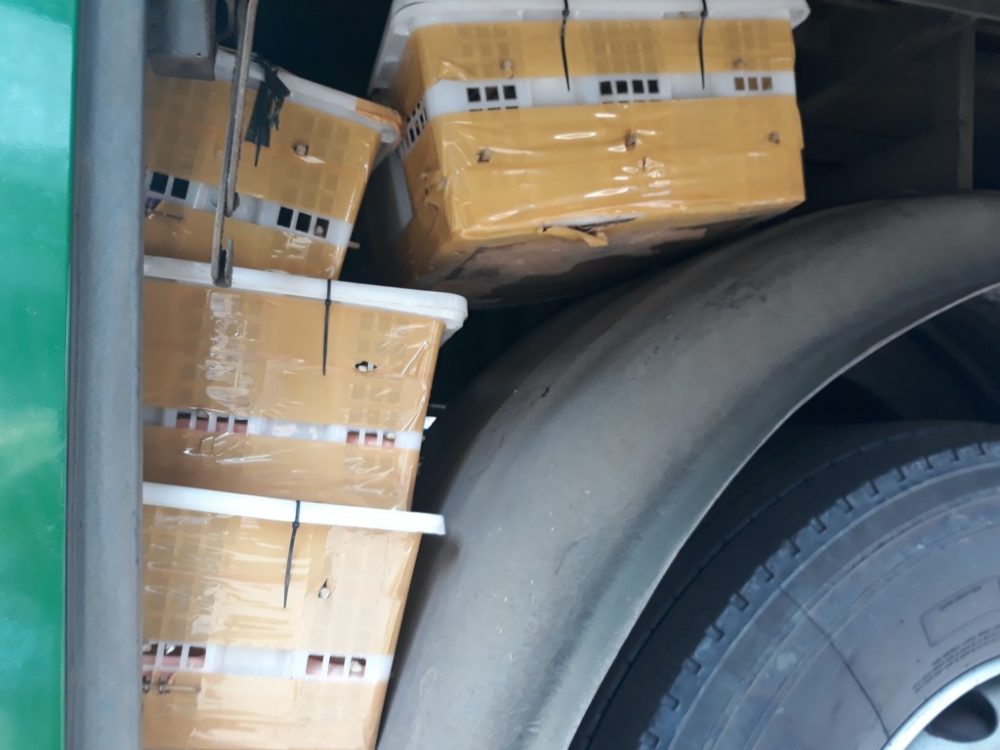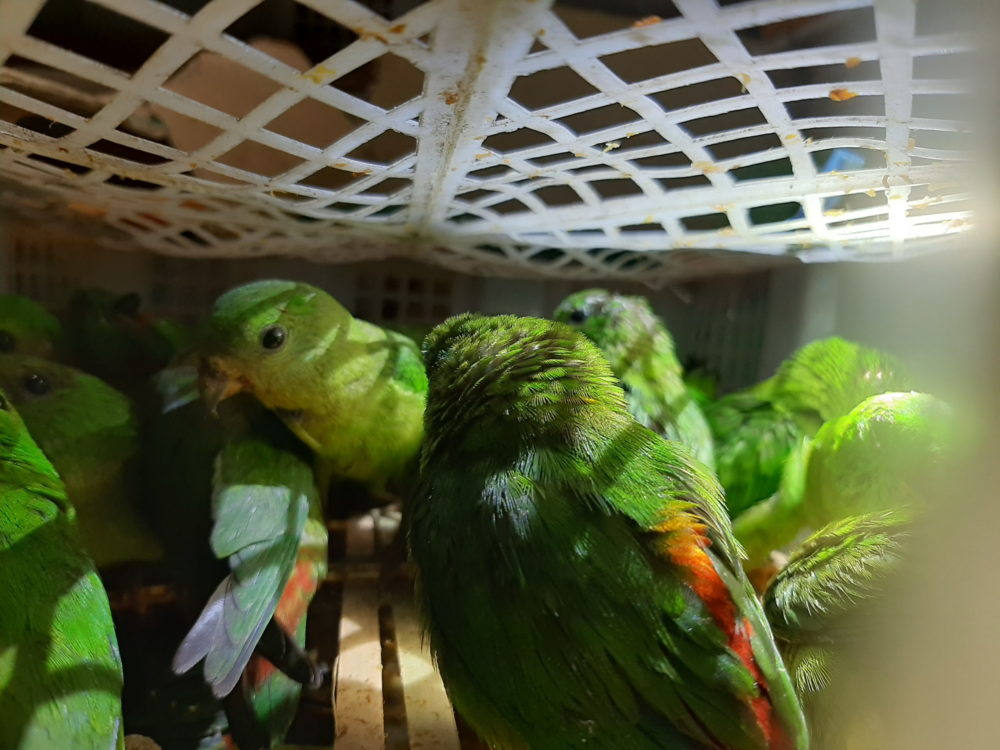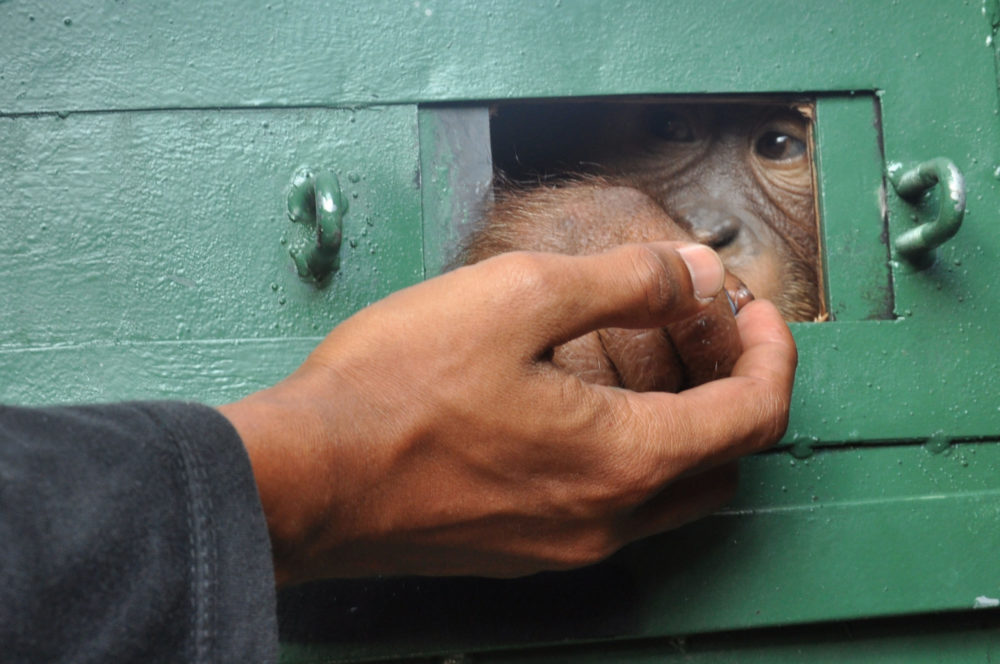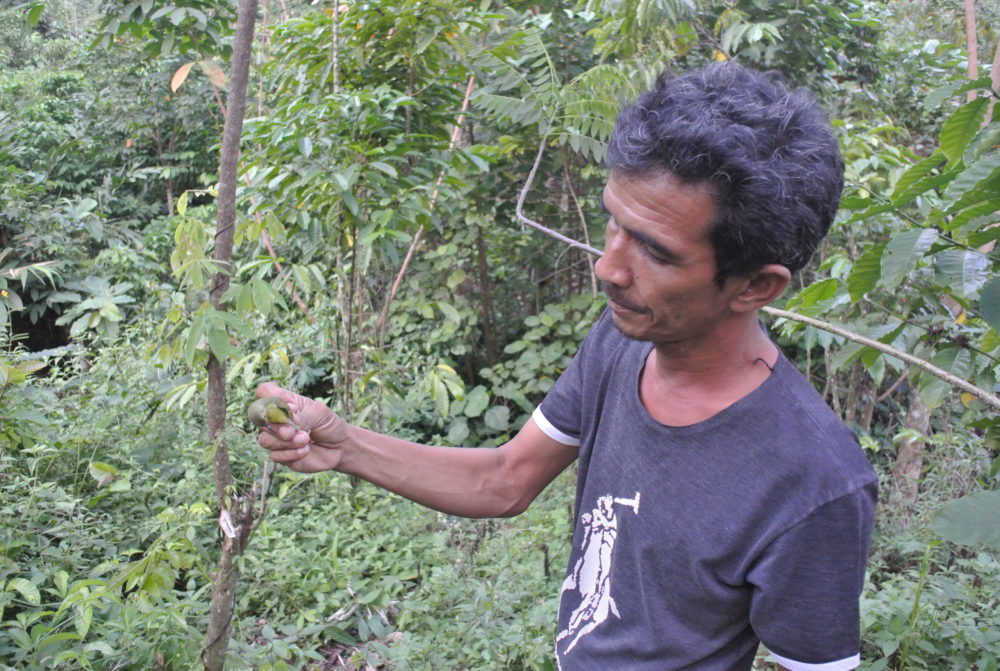Roughly a million songbirds, including some protected species, are estimated to have been smuggled off the western Indonesian island of Sumatra over the past year. The lucrative nature of the songbird business threatens the populations of a number of bird species as well as the balance of the forest ecosystem.
This story was originally published in Tempo Magazine on 5 September 2020.
By Mustafa Silalahi and Hendry Sihaloho
A plain-clothes police officer approached a white Daihatsu Xenia at the ticket checking post at Bakauheni Port in Lampung on Tuesday night, July 7, 2020. The car was waiting to board a ferry bound for Merak Port in Banten, West Java. The officer reached the driver’s side door and took a look back into the cabin, where he saw a stack of fruit boxes.
The officer then opened the front door and commandeered the vehicle. The driver, 42-year-old Diah Bayu, slid over to the passenger seat and the officer drove the vehicle to the Bakauheni Port Police Department, just a kilometer away from the ticket post.
“I was surprised, but I just followed it,” said Bayu, who gave an account of what happened to Tempo.
Police investigators questioned Bayu that night. He was arrested, and 400 birds kept in 43 used plastic fruit boxes were taken as evidence. Among those wild birds were the bar-winged prinia (Prinia familiaris), yellow-vented bulbul (Pycnonotus goiavier), Javan white-eye (Zosterops flavus), and purple-throated sunbird (Leptocoma sperata). Bayu is suspected of intending to smuggle those birds to his home in Purwokerto, Central Java.
“It’s a way to make money,” he said.
The next day the police turned Bayu and all of the birds over to the Bandar Lampung Agricultural Quarantine Center. He was lucky. He was released a few days later.
“He was given personal guidance and asked to write a statement that he would not be a repeat offender,” Adjunct Commissioner Ferdiansyah, Chief of the Bakauheni Port Police Department (KSKP), said on Friday, Sept. 4.
From January to August, the Bakauheni KSKP had prevented the smuggling of 32,000 wild birds through the port. All of those birds were turned over to quarantine officials.
“[This] sending of wild birds is illegal because it is done without papers on the domestic transportation of wild plants and animals,” said Muhammad Jumadh, head of the Bandar Lampung Agricultural Quarantine Center.
Law No. 21/2019 on the Quarantine of Animals, Fish and Plants requires that all birds taken from the forest must undergo an inspection by quarantine center officials. If they don’t, there is a maximum punishment of 10 years’ imprisonment and a maximum fine of Rp10 billion (US$674,000).
If the animals taken out of the forest are protected by law, violators can be charged under Law No. 5/1990 on the Conservation of Biological Natural Resources and Their Ecosystems, as well as under Law No. 14/1999 on Forestry. Violators can face a maximum sentence of five years’ imprisonment. In 2020, nine smugglers were sentenced to four to six months imprisonment in Lampung.
Related: Quarantine Law, a new hope in eradication of wildlife smuggling
However, the threat of imprisonment and fines has not deterred smuggling. It is estimated that the number of birds smuggled is much higher than the number intercepted at Bakauheni. Marison Guciano, executive director of Flight: Protecting Indonesia’s Birds, a wildlife trade watchdog, estimates a million birds have been illegally captured in the forests of Sumatra over the past year.
Over the past five years, Guciano calculated that about 14 million wild birds, including some protected species, have been taken to Java by land, sea and air. He based his calculation on Flight’s data on sales from over 2,000 bird stores in Sumatra and Java. “This is because the demand from the songbird community is rising every year,” he said.
Makhfudz Solaiman, a businessman and founder of the Nusantara Bird Breeders Association, estimates that there are 13-14 million songbird enthusiasts in Indonesia. And the potential demand from this market has increased interest in the songbird business.
“The financial turnover in this business is Rp3-5 trillion annually,” said Solaiman, better known as Kang Ebod.
Minister of Cooperatives and Small and Medium Enterprises (SMEs) Teten Masduki said that the songbird trade involves many parties. There are bird breeders, bird catchers, makers of bird cages and accessories, bird feed and medicine producers and people who run bird competitions.
“The ‘songbird mania’ community is very large and is found in every region,” he said in an interview in early Septembeer. In February of this year, Masduki held a songbird competition called the Minister of Cooperatives and SMEs Cup. He also came up with the Indonesian Songbird Community Cooperative for bird breeders.
This business in increasingly endangering the songbird population, particularly birds from Sumatra, said Hifzon Zawahiri, head of the Natural Resource Conservation Center’s (BKSDA) Section III, which covers Bandar Lampung and Bengkulu. The high demand for songbirds has resulted in the growth of smuggling over the past two years, he noted.
The highest demand is in Java
Those involved in this business like Sumatran birds because of the variety of their warbling and chirping, said Zawahiri. One popular bird that is often entered in competitions is the oriental magpie-robin (Copsychus saularis).
“They can smuggle up to 1,200 magpie-robins at a time to Java,” Zawahiri said. “Just imagine how many buyers there.”
It is believed that this smuggling goes on morning, day and night. Occasionally the smuggling involves protected songbirds, such as the blue-winged leafbird (Chloropsis cochinchinensis), crested jay (Platylophus galericulatus), and blue-crowned hanging parrot (Loriculus galgulus) — all species that are popular among bird enthusiasts.
Tempo found some blue-winged leafbirds for sale in Curug, Kepahiang and Bengkulu. Banners promoting shops that sell such birds could also be seen around Bandar Lampung in July when Tempo reporters conducted their investigation.
Not all of the smuggling has been exposed. Each week, the police and the Quarantine Center expose three to five smuggling attempts. Guciano estimated that undetected smuggling is 20 times higher. He referred to information he obtained from bird sellers in a number of provinces.
The smugglers, according to Guciano, do not only use Bakauheni Port as an entry point into Java.
“The smuggling utilizes many other ports in Sumatra and airports in Medan and Batam,” he said.
Smugglers also use various methods in order to send wild birds. The most common way is to send them over roads traversing Sumatra. Vendors sneak them onto buses traveling between provinces.
Before heading out, tens of birds are put into plastic boxes previously used for storing fruit. The smugglers fool workers by hiding the boxes on the bus.
Tempo found that these boxes are hidden under the rearmost passenger seats. Some are hidden in the baggage area near the wheels and engine. This often results in the birds dying along the way due to heat.
The latest method is to smuggle birds using a rented vehicle. Bayu rented his friend’s car to pick up a load of birds from vendors in Bengkulu, West Sumatra, and Jambi. He used a car with tinted windows. Bayu covered the boxes containing the birds with black netting.
“I rented that car for Rp275,000 a day,” he said.
Sellers with more resources use other methods. They send birds via cargo planes. Musokib, a wholesale songbird vendor in Muaro Jambi, said that the airport in Medan is the most-frequently used location for sending birds off the island.
“It can all be ‘taken care of’ through the airport in Medan,” he told Tempo.
However, he prefers land routes due to the lower costs involved. Musokib said that he often uses the services of insiders at a number of institutions when sending songbirds to Java. He said that all bird vendors do this so that their shipments are not stopped by officials.
The insiders also help monitor the situation, telling vendors, for example, when officials are planning raids in the field. “If this is not done, the birds won’t get through,” said Musokib, who has been selling birds for seven years. Vendors refer to these insiders as umang-umang.
Traders do not hesitate to pay informants on account of the lucrative nature of selling wild birds. Musokib buys Javan white-eyes (Zosterops flavus) from bird catchers or suppliers for Rp6,000-8,000 each. He then sells them to vendors in Java for Rp18,000 a piece.
If he sends a thousand of them, Musokib estimates that he could make up to Rp11 million (US$740). He says that each shipment will be completely bought up by vendors in Java. “The turnover of funds in the songbird business is very fast,” he said.
Despite being caught by the police, Bayu also used the services of an umang-umang. This particular informant was a worker at the Bakauheni Port named Pawan. He paid him Rp400,000 when passing the port checkpoint. Bayu said that he does not know what institution Pawan works for. “He does not wear a uniform,” he said
Zawahiri verified the involvement of officials in smuggling songbirds. He shared his experience when attempting to confiscate protected songbirds at the airport. His team was actually intercepted by officials there as they attempted to enter the airport. “As thieves, they outsmarted us,” he said.

Watered-down regulation encourages smuggling
Dozens of protestors went to several locations in Bandar Lampung in mid-2018. They were protesting Ministry of the Environment and Forestry Regulation No. P20/2018 on Protected Plant and Wildlife Species, which was signed in June 2018. “The protestors came in Toyota Fortuner and Mitsubishi Pajero automobiles,” said Bandar Lampung BKSDA Head Zawahiri.
A similar protest was organized by “kicau mania” (songbird mania) —a nickname for songbird enthusiasts — in Jakarta. This regulation placed the white-rumped shama (Kittacincla malabarica), pied myna (Gracupica jalla), and straw-headed bulbul (Pycnonotus zeylanicus) on the list of protected species. These three types of birds are frequently entered in songbird competitions.
This pressure was effective. Two months after the Minister of Environment and Forestry Regulation No. P20 went into effect, the Minister of the Environment, Siti Nurbaya, took those three species, plus the small shrike thrush (Colluricicla megarhyncha) and Sangihe shrike thrush (Collurincincla sangiherensis) off the list of protected birds through Regulation of the Environment and Forestry Ministry No. P92/2018.
Four months later this regulation changed again, becoming Regulation of the Environment and Forestry Ministry No. P106/2018. This regulation continued to keep those five species off the list of protected birds.
“The straw-headed bulbul, blue-winged leafbird, and oriental magpie-robin are very popular with the songbird mania group due the quality of their voice,” said Minister of Cooperatives and SMEs Masduki.
Masduki said that he has met Minister Nurbaya. “I had a short meeting with her to talk about the matter of songbird breeding,” he said. He denied influencing Nurbaya to change the regulation.
Wiratno, Director General for Conservation and Natural Resources and Ecosystems, did not respond to Tempo’s interview request. Neither did the director of Biodiversity and Conservation, Indra Exploitasia. The director of Forest Prevention and Security, Sustyo Iriyono, was reluctant to comment. “My apologies, I cannot not yet [speak] on this,” he said via a WhatsApp message when asked about songbird smuggling and the existence of any pressure to change the Ministry of the Environment and Forestry Regulation No. P20/2018.
Guciano said that Ministerial Regulation No. P106 indicates that the government is not concerned about the preservation of wild birds. He considers that removing those five birds from the protected species list encourages songbird smugglers and enthusiasts.
“Today the bird population is much lower due to exploitation,” he said.
Birdlife International, an organization focused on protecting birds and their habitats, notes that the wild straw-headed bulbul population is currently somewhere between 600 to 1,700. The remaining number of pied myna is even less, just 49 birds, it estimates.
Ganjar Cahyo Aprianto, a researcher from Burung Indonesia, the local affiliate of Birdlife International, said that the Sangihe strike thrush population is down to between 50 to 249 birds. This bird, he said, can only breed in the wild.
“The Sangihe strike thrush is in the critically endangered category. It should be protected,” he said.
Dewi Malia Prawiradilaga, a bird researcher at the Indonesian Institute of Sciences (LIPI), said that her team’s research last year concluded that the selling of the straw-headed bulbul, white-rumped shama, and other wild birds has endangered populations in Sumatra. “They are being over-caught,” she said.
Birds play an important role in pollinating flowers and spreading seeds in the forest. They also control the pest population. Prawiradilaga said that the decline in the bird population endangers the balance of the forest ecosystem.
She has personally noticed that the sounds of songbirds in the forests in Sumatra are disappearing.
“The more popular a type of songbird becomes, the rarer it becomes in the wild,” she said.
Read also: The hard life of an Indonesian bird catcher
This version has been edited for clarity and style. Tempo conducted this coverage in cooperation with Internews’ Earth Journalism Network.


